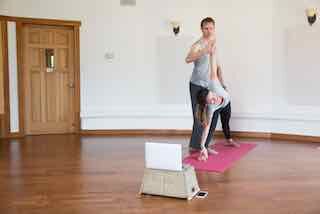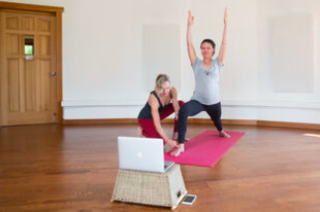Media
Zoom Yoga? How to Stop Worrying and Connect in the New Normal
A Personal Perspective: Hybrid social connections keep us going.
Posted January 13, 2022 Reviewed by Lybi Ma
Key points
- You can enhance your well-being by being open to healthy social activities, even those accomplished via tools like Zoom.
- We can meet our social needs in a variety of ways, including non-traditional ones such as streaming movies together.
- Hybrid connections are those that take place both in person and via media.
As we are all well aware, the pandemic has turned normalcy on its head. And just when we thought some normalcy might be in sight, another bend in the road comes into sight.
How do we cope with lengthy and changing uncertainties? One way involves purposefully finding non-traditional solutions. They may be just what the doctor ordered for this non-traditional time.
Fill Your Tank
Social psychologist Shira Gabriel and her colleagues have studied both traditional and non-traditional ways we meet our social needs.1 Traditional ways include having a cup of coffee with a friend in person. Non-traditional ones include watching a television program that makes you feel connected to the characters in that world. According to this research, both of these strategies fill what Gabriel and colleagues call our “social fuel tank.”
During the pandemic, many people learned what it means to have a Zoom meeting with our colleagues and even with our family members. Though meeting in person has advantages, it’s healthy to adapt to the situation we are in and find ways to thrive there.
Zoom Yoga?

When the pandemic first hit, the hardest thing for me to accept losing in my personal life was my ability to attend live yoga classes. I had been in the habit of going to three or more yoga classes a week and I wondered how I would manage without the health benefits of yoga itself and of community presence.
Then an opportunity came up. My good friend from college, Mariko, and I started to meet and chat on Zoom. We decided to try to do yoga together via Zoom, not knowing how it might work out. I knew of a site called Doyogawithme and suggested we try that.
My friend and I met three times and week for chats and yoga. We learned to appreciate different instructors on the site and chatted about favorite moves and styles. We’re still meeting and yoga-ing (is that a word?) and I’ve also been able to start back again doing yoga in person.
Recently, I have felt inspired to start yoga teacher training. The training is hybrid, the same model I use in my university teaching as a psychologist. Training involves some recorded videos, some live streaming, some social media connections, and some face-to-face time, among other ways of connecting.

Rethinking What Fills Our Social Fuel Tanks
As I began yoga teacher training, I got an opportunity to teach a couple of live classes. One thing I learned instantly is that the teachers who have influenced you show up in your own teaching. Sure enough, I was using moves and ideas from my face-to-face experiences. I also realized, even to my own surprise, how much some of my favorite instructors from Doyogawithme came through in my teaching.
I think this is another example of how mediated and other non-traditional types of connections can play a stronger role in our own social worlds than we might guess. Even I as a media psychologist was surprised at how strong an influence these experiences were for me. Like I mentioned, many of my own teaching sessions as a psychology professor happen via Zoom, on the phone, on text, and through other forms of communication. Lots of them happen in person. Both of them have helped me to learn and connect.
We are all in this together. I hope you have found or will find non-traditional ways of learning and staying connected.
References
Paravati, E., Naidu, E., & Gabriel, S. (2021). From “love actually” to love, actually: The sociometer takes every kind of fuel. Self and Identity, 20(1), 6–24. https://doi.org/10.1080/15298868.2020.1743750


